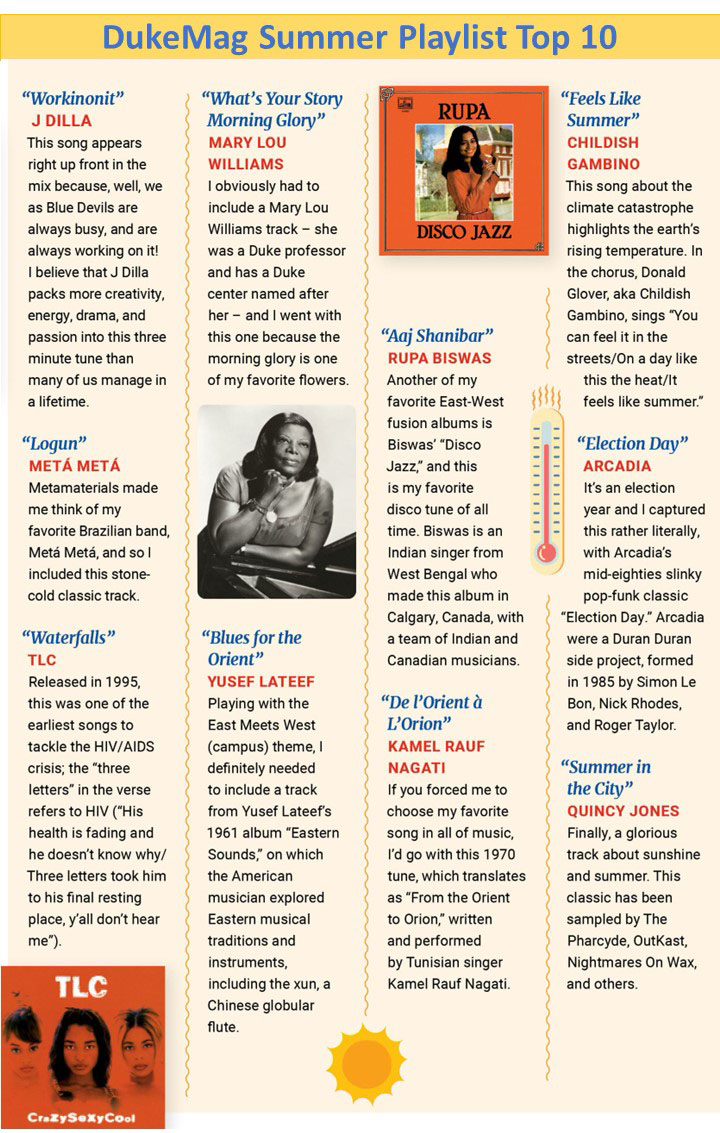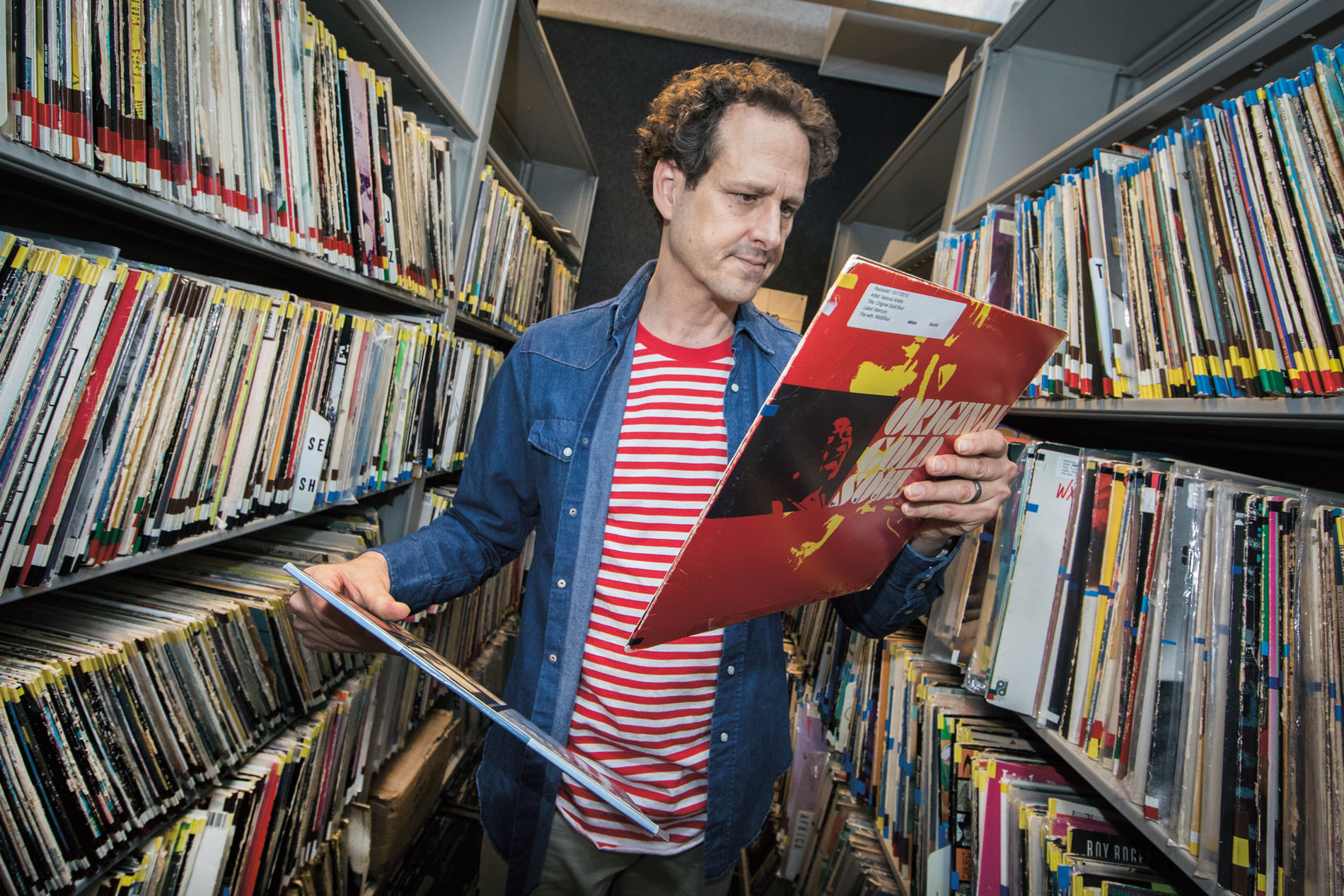London. It’s the 1970s. Outside an apartment building a young boy and his dad sit in their car. The sun is setting and they should probably go inside, but Van Morrison’s live album “It’s Too Late to Stop Now” is playing. They can’t turn it off.
Born in Cape Town, South Africa, in 1968, young Gavin Yamey had just moved to London with his family. From his dad’s record collection, rich with jazz, soul, R&B and gospel, to the “New Romantic” club scene Yamey would frequent as a teenager, it was the perfect environment for a budding music appreciator.
“I have a very early memory of my dad dropping me and my friend Jason off – we were probably 12 or 13 – to see [the band] Japan at Hammersmith Odeon, and Jason and I going into the bathroom and getting makeup on and dye in our hair,” recalls Yamey, a tall kid who used his height to get into music venues at a young age. “End of the gig, we washed off all the makeup and hair dye and then his dad came to pick us up – very iconic defining kind of episode for me.”
Today Dr. Gavin Yamey is the Hymowitz Family Professor of the Practice in Global Health, with multiple director roles at Duke Global Health Institute, yet music remains a through line in everything he does. As Professor G, he hosts “Musical Odyssey,” a weekly radio show on Duke student station WXDU. In his classrooms, Yamey creates themed Spotify playlists around global health topics. He is especially pleased with the playlist for his Global Health Challenges course about infectious diseases and infectious disease control, which included Nigerian musician Seun Kuti’s “Mosquito Song” and Van Morrison’s “T.B. Sheets.”
“It's a way of approaching the topic beyond academic articles, data and analytics. It's a way of infusing a different element, perhaps a fun element, a creative element,” says Yamey. “I only ever include music that I think is wonderful and beautiful and enriching and inspiring.”
We asked Professor G, aka Gavin Yamey, to curate a playlist that reflects the eclectic mix of stories and photos in this issue of DukeMag. That meant songs that referenced the range from our metamaterials cover story to the flowers in Duke Gardens, from an HIV vaccine and climate change to our East Meets West photo collection. Yamey explains his selections in this Top 10. Keep scrolling for his extended playlist and the reasons for his selections.

Why I Chose These Songs
By GAVIN YAMEY
I curated this mixtape by drawing inspiration from the planned articles in the summer issue of Duke Magazine—such as on HIV vaccine research, the upcoming presidential election, the climate crisis, the Duke campus farm, the cherry blossoms in Duke Gardens, East Meets West, and students who are social media influencers. I also included some summer classics and a couple of tunes that are about being a professor. Indeed, the mixtape is bookended by two tunes that riff on the professor theme: It opens with “The Professor Is Here” (by Gary Davis) and closes with a track by Professor Rhythm.
J Dilla’s “Workinonit” appears right up front in the mix because, well, we as Blue Devils are always busy, and are always working on it! I believe that J Dilla packs more creativity, energy, drama and passion into this 3-minute tune than many of us manage in a lifetime.
Several of my picks are tunes that deal in some way with HIV. Michael Franti and Spearhead’s “Positive” appeared on the legendary “Stolen Moments: Red Hot + Cool” compilation put out by the Red Hot Organization to raise awareness of and funding for HIV/AIDS. TLC’s “Waterfalls,” released in 1995, was one of the earliest songs to tackle the HIV/AIDS crisis; the “three letters” in the verse refers to HIV (“His health is fading and he doesn't know why/Three letters took him to his final resting place, y'all don't hear me”).
I riffed pretty heavily on the theme of gardens, cherry blossoms, and the farm, picking many of my favorite artists, especially jazz musicians and groups. Don Ellis’s uplifting “Dew,” from his 1973 album “Haiku,” is 1 minute and 28 seconds of intense orchestral beauty that captures the majesty of the morning garden as it wakes. I also chose Matthew Halsall’s “Cherry Blossoms,” Irreversible Entanglements’ “root < = > branch,” Little Simz’s “The Garden,” The Blow Monkeys’ “Wildflower,” Jorja Smith’s gorgeous cover of “Rose Rouge” (by legendary French house producer St Germain), D*Note’s “The Garden of Earthly Delights,” and Cerrone’s disco classic “Supernature.” I obviously had to include a Mary Lou Williams track—she was a Duke professor and has a Duke center named after her—and I went with “What’s Your Story Morning Glory” (the morning glory is one of my favorite flowers). Fun Boy Three’s reggae-tinged, post-punk “Farmyard Connection” is the finest farm-themed tune ever put to vinyl!

I had a wonderful time playing on the East Meets West theme, in part because I have a deep love of music that fuses these regions of the world. So, you’ll see in my mixtape “Duality,” one of the greatest East-West Hip-Hop Fusion cuts of all time, bringing together DJ Krush from Tokyo, Japan and DJ Shadow from Marin County, California. I definitely needed to include a track from Yusef Lateef’s 1961 album “Eastern Sounds,” on which the American musician explored Eastern musical traditions and instruments, including the xun (the Chinese globular flute). I went with “Blues for the Orient.” One of my favorite “East Meets West” albums is “Goshu Ondo Suite,” a remarkable collaboration between pianist Eri Yamamoto (born in Japan, now living in New York City) and Choral Chameleon, a 50-person choir from NYC (Part 4 of the suite is on my mixtape). Another of my favorite East-West fusion albums is Rupa’s “Disco Jazz,” from which I took the track “Aaj Shanibar,” my favorite disco tune of all time. Rupa Biswas is an Indian singer from West Bengal who made this album in Calgary, Canada, with a team of Indian and Canadian musicians. If you forced me to choose my favorite song in all of music, I’d go with RK Nagati’s 1970 tune “De l’Orient à L’Orion” (From the Orient to Orion), written and performed by Tunisian singer Kamel Rauf Nagati
Why did I choose Anohni’s apocalyptic tune “4 degrees”? A 2015 study found that if human-made greenhouse gases continued to be emitted at the 2015 rate of emission, the temperature would rise by more than 4 degrees Celsius by the end of the century, threatening a sixth of the world’s species with extinction. Childish Gambino’s “Feels Like Summer,” a song about the climate catastrophe, highlights the earth’s rising temperature (in the chorus, Donald Glover, aka Childish Gambino, sings “You can feel it in the streets/On a day like this the heat/It feels like summer”). Joni Mitchell’s “Big Yellow Taxi” is probably the most famous, most influential, and most important song about how humans are causing environmental destruction. She wrote the song after a 1969 trip to Hawaii, where she saw a giant parking lot that was tarnishing the islands—“Don’t it always seem to go,” sings Mitchell, “you don’t know what you’ve got till it’s gone/They paved paradise and put up a parking lot.” One of the earliest ever albums to deal with climate change and environmental degradation was David Axelrod’s “Earth Rot,” released in 1970, from which I took “The Signs Part I.”
To link with the magazine’s Voices section, I picked Donny Hathaway’s “Voices Inside (Everything Is Everything),” the title track of his debut studio album, an unparalleled soul masterpiece. The mixtape also has my favorite Police song, “Voices Inside My Head,” and the tune “To That Voice And Say” by one of today’s most exciting musical innovators, the British saxophone player/poet Alabaster DePlume.
It’s an election year and I captured this rather literally, with Arcadia’s mid-eighties slinky pop-funk classic “Election Day.” (Arcadia were a Duran Duran side project, formed in 1985 by Simon Le Bon, Nick Rhodes, and Roger Taylor.)
Riffing off social media messaging at Duke, we have “The Message” by British funk band Cymande and Cedric “Im” Brooks & The Light of Saba’s “Words of Wisdom.”
Metamaterials made me think of my favorite Brazilian band, Metá Metá, and so I included their stone cold classic track “Logun.”
The summer issue has a section called Stories From Our Archives, which features stories from Duke's history; Brittany Howard rightfully sings that “History Repeats.”
“Golf Girl” is the greatest golf-themed song ever written, by Britain’s jazz-adjacent prog rock heroes, Caravan, from their beloved third album “In the Land of Pink and Grey.” The song has the cheeky opening verse: “Standing on a golf course dressed in PVC/I chanced upon a golf girl selling cups of tea/She asked me did I want one, asked me with a grin/For thruppence you can buy one full right to the brim.”
Finally, my mixtape is heavy on some glorious tracks about the sunshine and summer: Alain Bellaïche’s sublime 1976 tune “Sun Blues,” Quincy Jones’ “Summer In The City” (sampled by The Pharcyde, Outkast, Nightmares On Wax, and others), Caribou’s club classic “Sun,” Mr. Hermano’s miraculous cover version of Santana’s “Free As the Morning Sun,” the 1969 German jazz meets psych rock “Take Off Your Clothes and Feel the Setting Sun” by Wolfgang Dauner, Blue Lake and Laraaji’s “Sun Arcs,” and my favorite blissed out sunny dub tune “Sunshine” by Sun Araw, M Geddes Gengras and The Congos.
A happy summer to all!
